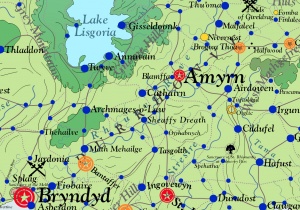Difference between revisions of "Durrhaunve"
Trismegistus (talk | contribs) m |
Trismegistus (talk | contribs) m |
||
| Line 1: | Line 1: | ||
[[File:MapDurrhaunve.jpg|thumb|300px|Durrhaunve, the "Land of the Rhaunve River," rests in southern [[Pytharnia]] ]] | [[File:MapDurrhaunve.jpg|thumb|300px|Durrhaunve, the "Land of the Rhaunve River," rests in southern [[Pytharnia]] ]] | ||
| − | Durrhaunve is a great river valley through which the [[Rhaunve River]] flows into the [[Sea of Asbardy]]. It corresponds roughly with the Rhaunve River Drainage System and is not a political state. The [[Archduchy of Asbardy]], the [[Archpatriarchy of Ambrasia]], the [[Duchy of Flamander]], a subject principality of the [[Empire of Magdala]], and the southern portion of the [[Commonwealth of the Ithrads]] are part of Durrhaunve. Historically, Durrhaunve has its own expression of the worship of the [[Isxinthion Gods]]. The [[Rhaunve River]] is the most significant geographic feature of the land and is important to the economy and commerce of the region. | + | Durrhaunve is a great river valley through which the [[Rhaunve River]] flows into the [[Sea of Asbardy]]. It corresponds roughly with the Rhaunve River Drainage System and is not a political state. The [[Archduchy of Asbardy]], the [[Archpatriarchy of Ambrasia]], the [[Duchy of Flamander]], a subject principality of the [[Empire of Magdala]], and the southern portion of the [[Commonwealth of the Ithrads]] are part of Durrhaunve. Historically, Durrhaunve has its own expression of the worship of the [[Isxinthion Gods]]. The [[Rhaunve River]] is the most significant geographic feature of the land and is important to the economy and commerce of the region. The name 'Durrhaunve' comes from ancient Moigthe and means Land of the Rhaunve River ['Dur' + 'Rhaunve']. |
After the [[Fall of the Yophenthean Empire]], the colonial language became the [[Ambrasian Language]]. The [[Settlement of Gonfaloy]] introduced the [[Medibgóëse Language|Medibgösk Language]] that became modern [[Gonfalese Language|Gonfalese]]. | After the [[Fall of the Yophenthean Empire]], the colonial language became the [[Ambrasian Language]]. The [[Settlement of Gonfaloy]] introduced the [[Medibgóëse Language|Medibgösk Language]] that became modern [[Gonfalese Language|Gonfalese]]. | ||
Revision as of 04:09, 19 February 2018

Durrhaunve is a great river valley through which the Rhaunve River flows into the Sea of Asbardy. It corresponds roughly with the Rhaunve River Drainage System and is not a political state. The Archduchy of Asbardy, the Archpatriarchy of Ambrasia, the Duchy of Flamander, a subject principality of the Empire of Magdala, and the southern portion of the Commonwealth of the Ithrads are part of Durrhaunve. Historically, Durrhaunve has its own expression of the worship of the Isxinthion Gods. The Rhaunve River is the most significant geographic feature of the land and is important to the economy and commerce of the region. The name 'Durrhaunve' comes from ancient Moigthe and means Land of the Rhaunve River ['Dur' + 'Rhaunve'].
After the Fall of the Yophenthean Empire, the colonial language became the Ambrasian Language. The Settlement of Gonfaloy introduced the Medibgösk Language that became modern Gonfalese.
Historic Trade
Before the advent of Dragonrail and Titanships, the trade cycle would bring goods down the Rhaunve River coming southwest to Bryndyd. Then merchants would load goods in skycraft and skybarges and voyage with the benefit of westerly winds to Sheaffy Dreath or Amyrn where they would sell the goods and then use barges to bring goods back down the river. The barges would also be cycled, but the skyflight would enable the merchants to undercut competitors and purchase more goods before their barges sailing upstream would arrive.
Gods and Divinities
Chief gods of the Durrhaunve include the sun god, Amyrn, the Durrhaunvian Triad, and the River God, Rhaunfo. Other divinities include the goddess, Rhaunvoig, the goddess Glambsa of the harvest, and Aigchu, god of pilgrims and wanderers. The cult and religion of the sun god Amyrn was subsequently transformed in the Ambrasian Reformation.
See Also
| This article is a stub. It requires further development by the creator. |